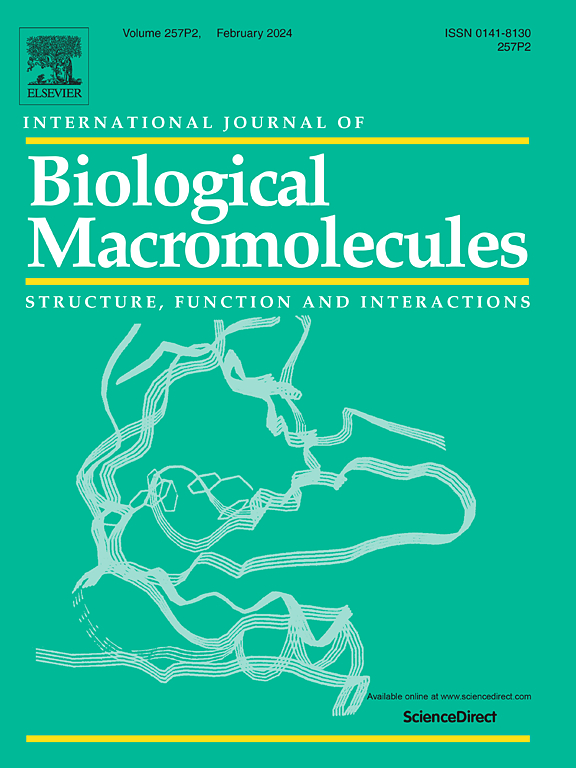CASK promotes prostate cancer progression via kinase-dependent activation of AKT
IF 7.7
1区 化学
Q1 BIOCHEMISTRY & MOLECULAR BIOLOGY
International Journal of Biological Macromolecules
Pub Date : 2025-05-05
DOI:10.1016/j.ijbiomac.2025.143965
引用次数: 0
Abstract
Until now, the role of calcium/calmodulin-dependent serine protein kinase (CASK) in prostate cancer (PCa) progression remains unknown. In this study, we investigated the roles of CASK in PCa progression, cell migration, and invasion. We found that CASK is up-regulated in PCa tissues of patients. Lentivirus-based CASK silencing does not affect cell growth or serum-free-induced cell death in PC3 and LNCaP cells, regardless of the presence or absence of TGF-β. CASK silencing decreases cell migration and invasion, either in the absence or presence of TGF-β stimulation. Immunoblotting data indicate that CASK silencing does not alter TGF-β-induced Smad2/3 and ERK phosphorylation but reduces TGF-β-induced AKT phosphorylation. To understand the roles of AKT and CaMK-like activity of CASK in cellular responses in PCa cells, we treated cells with AKT inhibitor and specific kinase inhibitors of CASK (NR162) and CaMKII (KN-93). We found that these agents can inhibit cell invasion and migration. In addition, NR162 and KN-93 also reduce TGF-β-induced AKT phosphorylation. Moreover, the co-immunoprecipitation data indicate the association between CASK and AKT. In HEK293 cells overexpressing system, we further found that CASK can enhance AKT S473 phosphorylation. The tumorigenic effect of CASK is confirmed in the xenograft mouse system. In summary, CASK is a promoter of PCa progression and can enhance PCa cell migration and invasion via kinase-dependent AKT activation independent of TGF-β-induced Smad2/3 and ERK signaling.
CASK通过激酶依赖性激活AKT促进前列腺癌进展
到目前为止,钙/钙调素依赖性丝氨酸蛋白激酶(CASK)在前列腺癌(PCa)进展中的作用尚不清楚。在这项研究中,我们研究了CASK在前列腺癌进展、细胞迁移和侵袭中的作用。我们发现CASK在PCa患者组织中表达上调。无论TGF-β是否存在,基于慢病毒的CASK沉默都不会影响PC3和LNCaP细胞的细胞生长或无血清诱导的细胞死亡。无论TGF-β刺激是否存在,CASK沉默都会减少细胞迁移和侵袭。免疫印迹数据表明,CASK沉默不会改变TGF-β诱导的Smad2/3和ERK磷酸化,但会降低TGF-β诱导的AKT磷酸化。为了了解AKT和camk样CASK活性在PCa细胞细胞反应中的作用,我们用AKT抑制剂和CASK特异性激酶抑制剂(NR162)和CaMKII (KN-93)处理细胞。我们发现这些药物可以抑制细胞的侵袭和迁移。此外,NR162和KN-93也能降低TGF-β诱导的AKT磷酸化。此外,共免疫沉淀数据表明CASK与AKT之间存在关联。在HEK293细胞过表达系统中,我们进一步发现CASK可以增强AKT S473的磷酸化。CASK的致瘤作用在异种移植小鼠系统中得到证实。综上所述,CASK是PCa进展的启动子,可以通过激酶依赖性AKT激活而不依赖于TGF-β诱导的Smad2/3和ERK信号,从而增强PCa细胞的迁移和侵袭。
本文章由计算机程序翻译,如有差异,请以英文原文为准。
求助全文
约1分钟内获得全文
求助全文
来源期刊
CiteScore
13.70
自引率
9.80%
发文量
2728
审稿时长
64 days
期刊介绍:
The International Journal of Biological Macromolecules is a well-established international journal dedicated to research on the chemical and biological aspects of natural macromolecules. Focusing on proteins, macromolecular carbohydrates, glycoproteins, proteoglycans, lignins, biological poly-acids, and nucleic acids, the journal presents the latest findings in molecular structure, properties, biological activities, interactions, modifications, and functional properties. Papers must offer new and novel insights, encompassing related model systems, structural conformational studies, theoretical developments, and analytical techniques. Each paper is required to primarily focus on at least one named biological macromolecule, reflected in the title, abstract, and text.

 求助内容:
求助内容: 应助结果提醒方式:
应助结果提醒方式:


